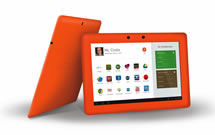Amplify moves to fix melted chargers, broken screens reported as $30M program rolls out in N.C.
 In the wake of much-publicized safety issues plaguing a 15,000-tablet initiative in Guilford County, N.C., schools, Brooklyn-based technology company Amplify said it will replace every device distributed under Guilford County’s tablet program in order to connect students to high-tech learning tools as quickly as possible.
In the wake of much-publicized safety issues plaguing a 15,000-tablet initiative in Guilford County, N.C., schools, Brooklyn-based technology company Amplify said it will replace every device distributed under Guilford County’s tablet program in order to connect students to high-tech learning tools as quickly as possible.
Reports of broken screens in about 10 percent of the tablets, along with melted chargers, prompted district officials to put the tablet program on pause.
Guilford leased more than 15,000 ASUS tablets from Amplify as part of a $30 million Race to the Top program designed to personalize learning for district students. That initiative, the Personalized Achievement, Curriculum, and Environment (PACE) program, launched this fall in 18 middle schools.
(Next page: Amplify reps pledge to correct tablet issues)
Responding to the problems, Amplify CEO Joel Klein sent Guilford County Superintendent Maurice Green a letter offering to replace all of the district’s tablets. Klein is the former New York City Schools chancellor.
“We are committed to supporting the PACE initiative and broader efforts to personalize learning for every student with software, hardware, and services that will serve as a model for other districts around the country,” Klein wrote.
“Towards that end, I want you to know that Amplify will replace the entire fleet of devices provided to Guilford County Schools with brand-new devices.”
At press time, Amplify teams were traveling to PACE schools to record problems, wipe student information from the tablets, and send them back to Amplify.
Amplify will send new devices—not replacements of the same devices—to the district, and officials are working to identify appropriate devices.
“This is extremely disappointing,” Green said when the district first put the program on hold in early October. “Until this matter has been resolved satisfactorily, we are not moving forward.”
The district’s major concern is with the devices and related equipment, not the academic content and software, according to Jake Henry, executive director of instructional technology.
The tablets came loaded with Khan Academy math and science videos, the Project Noah nature exploration tool, Encyclopedia Brittanica, Gooru, the Desmos graphing calculator, CK-12 eBooks, public domain eBooks, Ignition, and Math Map.
Middle school teachers have continued to deliver instruction to students in other formats while Amplify and the district explored proposed solutions.
“In October, Guilford County Schools informed us that a tablet charger, which was manufactured by ASUS, partially melted while charging a student’s tablet at home overnight,” said Justin Hamilton, Amplify’s senior vice president of corporate communications, in a statement to eSchool News.
Amplify asked all of its customers to cease further use of the chargers and tablets until the company could determine the cause of the melted charger. Lab results revealed no safety issues with the chargers, and Amplify informed the rest of its customers that they can resume using the chargers, Hamilton said.
“After we requested that Guilford cease using the tablet, local officials raised concerns about the durability of the ASUS tablet’s glass. We are looking into why Guilford has experienced a higher breakage rate than other tablet users across the country,” Hamilton said.
“In the meantime, we have committed to replacing the entire fleet of devices provided to Guilford County Schools with new devices. We are in still in the process of selecting a replacement option. This is an important decision, and it will take some time to reach the right choice,” he added. “Guilford still deeply believes in this effort. We are working very closely together to resolve these issues and get this important initiative back up and running as soon as possible.”
- 4 ways to support work-based learning - April 23, 2024
- Prioritizing inclusivity in game-based learning - April 22, 2024
- Friday 5: Universal Design for Learning - April 19, 2024

